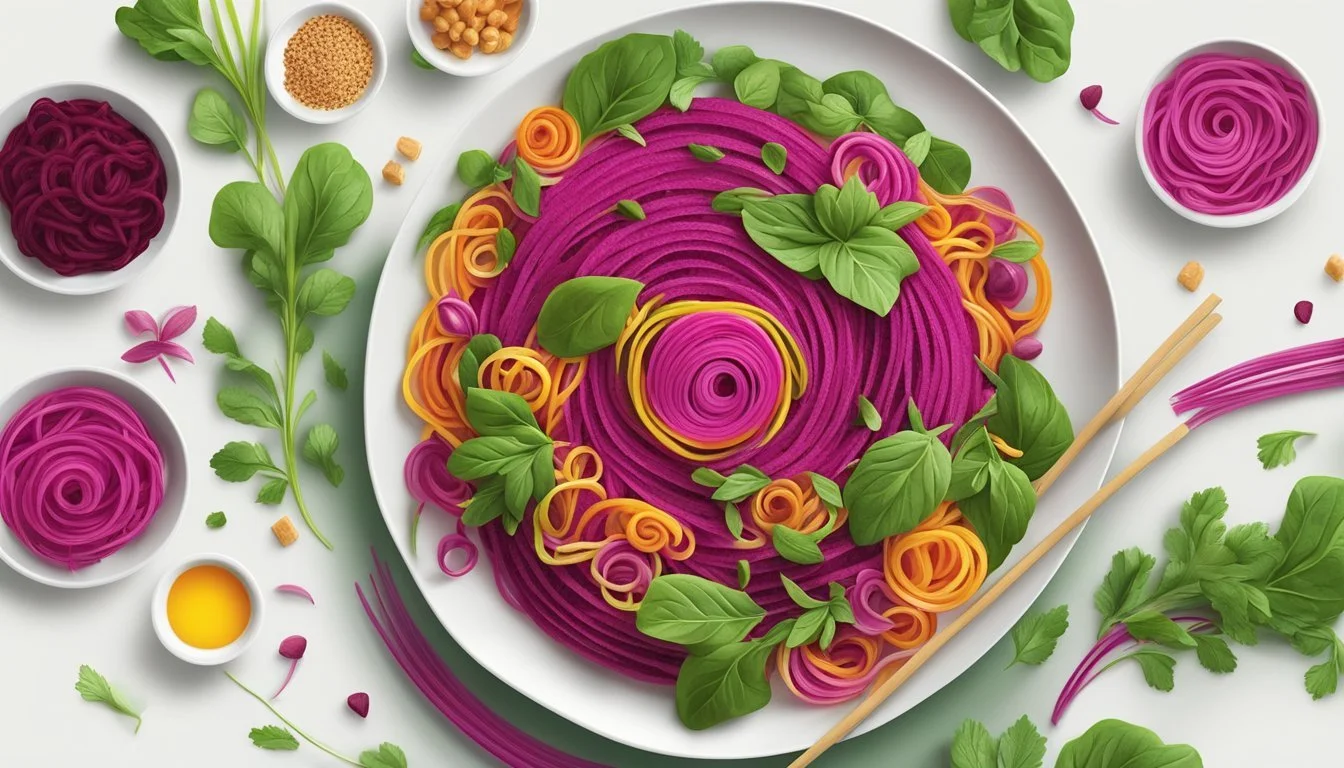Beet Noodle Substitutes
Top Alternatives for Your Pasta Dishes
Beets have long been cherished for their vibrant color, earthy flavor, and impressive nutritional profile. They are a source of fiber, vitamins, and minerals, and are particularly notable for their high levels of folate and antioxidants. For individuals following a vegan diet, beets offer a substantial benefit by contributing plant-based protein to their meals. Moreover, their versatility in the kitchen allows them to be an integral part of a variety of dishes, from salads to sauces.
Despite their benefits, some may seek alternatives to beets due to dietary restrictions, taste preferences, or simply for culinary diversity. There is a range of nutritious substitutes that maintain the health qualities of beets while providing their own unique textures and flavors. Turnips and red cabbage emerge as favorable replacements, both offering similar nutritional advantages including fiber, vitamins, and minerals. These substitutes can easily be incorporated into meals that traditionally feature beets, allowing for a seamless transition in recipes without sacrificing taste or health benefits.
Exploration into beet noodle substitutes specifically conjures a culinary adventure into veggie noodles, a concept that has gained popularity for its health advantages and creative approach to traditional pasta dishes (What wine goes well with pasta dishes?). Vegetables like zucchini, kohlrabi, and even seaweed can be transformed into noodle-like shapes and serve as a low-carb, nutrient-dense base for an array of sauces and toppings. Not only do these alternatives align with a health-conscious lifestyle, but they also cater to those seeking out novel textures and flavors in their diet.
Beet Basics
Beets, also known as beetroot, are a versatile root vegetable recognized for their deep red color and earthy flavor. These vegetables can be enjoyed raw or cooked, and they provide a wealth of nutritional benefits.
Nutrition Profile: Beets are a nutritious addition to any diet, offering dietary fiber, potassium, iron, and an array of other nutrients. Their rich color comes from betalains, which have been linked to health-promoting qualities.
Fiber: Contributes to digestive health.
Potassium: Essential for muscle function and nerve signaling.
Iron: Crucial for the transport of oxygen in the blood.
Flavor and Usage: The characteristic earthy flavor of beets can be attributed to geosmin, a compound that gives the vegetable its distinct taste. This flavor pairs well in a variety of dishes, from salads to smoothies. When cooked, their texture softens, making them suitable for a range of culinary applications, including noodle substitutes.
Colorful Varieties:
While red beets are common, they can also be found in other shades, such as golden or striped. Purple carrots are often touted as a similar-flavored alternative due to their comparable hue and nutritional makeup.
Health Benefits: Consuming beets may provide health benefits, such as improved blood flow and lower blood pressure. Their rich color can also add visual appeal to dishes, further encouraging a nutritious and varied diet.
Conclusion
When selecting beet noodle substitutes, one must consider not only taste and texture but also how they align with dietary needs and nutritional goals.
Allergies and Dietary Restrictions
For those with gluten allergies or following a gluten-free diet, substitutes like rice noodles or quinoa pasta are fitting choices due to their absence of gluten. Zucchini noodles (zoodles) and spaghetti squash are excellent for individuals looking for low-carb or vegetable-based alternatives. For vegans, most vegetable noodles, as well as lentil and chickpea pasta, meet the criteria, offering both a nutritious profile and compatibility with their dietary restrictions.
Maximizing Nutritional Benefits
Beet noodle substitutes pose a prime opportunity to enhance the dietary fiber, minerals, and antioxidants in one's meal. Substitutes like kelp noodles provide a wealth of minerals and a unique texture, while shirataki noodles are recognized for their low-calorie content and fiber.
Integrating substitutes such as buckwheat noodles can augment the levels of vitamins and fiber. To capitalize on the health benefits, it’s advisable to pair these substitutes with a variety of sauces and vegetables, creating a balanced and nutrient-dense dish. Moreover, savoring the natural flavors of these substitutes is not only a healthier alternative but also a creative way to explore new culinary territories.



